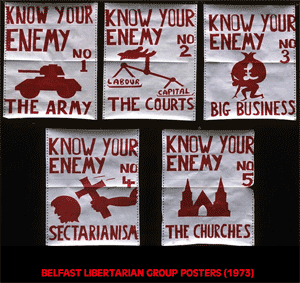Over 30 years of anarchist writing from Ireland listed under hundreds of topics
Library
The Nineteenth Century Irish Anarchism
Ireland, more than most countries in nineteenth century Europe, had a sizeable rate of emigration, between 1801 and 1921, for example, it is estimated that the population declined by 8 million.(1) As it had a bearing on almost every aspect of life it necessarily also affected political movements on the island, and contributed significantly to political movements elsewhere in the world where Irish emigrants settled.
A Wee Black Booke of Belfast Anarchism (1867-1973)
 A Wee Black Booke of Belfast Anarchism (1867-1973)
A Wee Black Booke of Belfast Anarchism (1867-1973)
by Máirtín Ó Catháin
Contents
Introduction
Anarchism in an Irish and Ulster Context
The Nineteenth Century
The Early Twentieth Century
The Later Twentieth Century
Conclusion
Bibliography
The Two Octobers (1927) by Piotr Archinov
The victorious revolution of the workers and peasants in 1917 was legally established in the Bolshevik calendar as the October Revolution. There is sane truth in this, but it is not entirely exact. In October 1917 the workers and peasants of Russia surmounted a colossal obstacle to the development of their Revolution. They abolished the nominal power of the capitalist class, but even before that they achieved something of equal revolutionary importance and perhaps even more fundamental.
Friends of Durruti - a balance sheet
WHAT WE THINK
To the activist who strives to contribute to the birth of an authentic memory of the anti-authoritarian current of the workers' movement, the question is posed thus: what is the contribution of the historic episode that was the acts and ideas of the Friends of Durruti? Therefore to complete this study, we must draw up a balance-sheet, to assess in some way their achievements and failures.
The 'Friends of Durruti' and the 'People's friend' part 2
WAR AND REVOLUTION
In the first issue, there is an article on page 4 with the very title "war and revolution". Here are the main passages.
The 'Friends of Durruti' and the 'People's friend' - part 1
WHO WERE THE FRIENDS OF DURRUTI
We saw, in part one, that opposition began to show itself against the lawyers who were, to a greater or lesser extent, accustomed to ministerial collaboration. Notably the Catalan Libertarian youth had declared their refusal to "become accomplices by staying silent" and they had even added "we are ready to return to illegal existence if necessary..."
The bourgeois republic and the revolutionaries
THE REPUBLIC OF 14 APRIL 1931
The anti-fascist camp in the Spanish revolution
It is absolutely necessary - the Friends of Durruti tried to point out - to find a path which allows revolutionaries, without compromising and without falling into an unprincipled anti-fascist front, to have a practical strategy of struggle which unifies the proletarian forces against the violent blows of the reaction, militarism and fascism. One understands why the Friends of Durruti, should have given such importance to the so-called choice 'war or revolution'
But, before addressing the events and their analysis, we must lay out, as briefly as possible, the composition of the forces present on the "antifascist" side, in order to assist the journey of the non expert reader across what one author has called the "Spanish Labyrinth". The bibliography which we give will allow one to find fuller information.
Introduction to the writings of the Friends of Durruti - George Fontenis
Barcelona, May 1937. The first issue of 'The People's Friend', the organ of the Friends of Durruti, appeared. The police repression of the Republican state had just crashed against the fighters of the barricades who had responded to the stalinist provocations by retaking the road of revolution. But while the combattants of the revolution were taking the fight to the forces of repression of the Catalan Generalitat and of the central state, the anarchist 'leaders' of the CNT-FAI, having become ministers of the bourgeois government, asked the victors of the barricades to lay down their arms, to have faith in their 'leaders' to settle the conflict and to reunite the anti-Franco forces.
Preface to the 1st edition (1983) by Daniel Guerin
George Fontenis' study seems useful to me, indeed I would go so far as to say it is valuable, not only as it teaches a better understanding of the Spanish Revolution of 1936-7 but it also provides a more extensive interpretation of the notion of libertarian communism itself.

